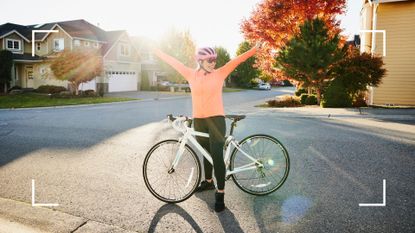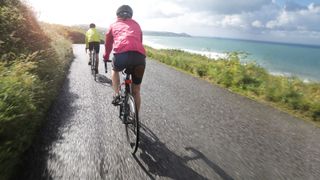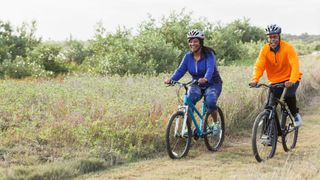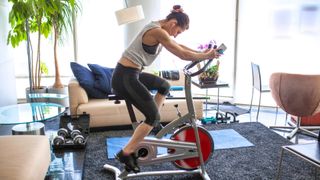There are so many benefits of cycling for women over 40 - but these are the most unexpected ones
The benefits of cycling are endless but most people don't know them all. Here, experts reveal the more surprising ones


It'll come as no surprise to learn that there are many benefits of cycling. We know it's a great exercise for improving our heart health, getting fit, and enjoying the great outdoors. However, there are some unexpected positive side effects of being on the bike regularly - especially for women over 40 - that many people don't know about.
For example, did you know that cycling has been proven to increase confidence? That cycling can seriously improve the way some people experience perimenopause symptoms? Or that there are major benefits to cycling in the morning compared to later in the day? You're not the only one if not. While cycling may be one of the most popular sports in the world, these potential benefits often go unnoticed.
Whether you like to do cycling as a workout indoors or outside that's up to you, either way, you can take advantage of all the many benefits of cycling on offer. To help you discover a few of the unexpected ones, from the truth behind spinning for weight loss to the core differences between running vs cycling, woman&home speaks to certified cycling coaches and a physiotherapist.
Benefits of cycling
1. Cycling in the morning can help improve your concentration
If you're an early bird when it comes to working out, we have some good news for you. Heading out on the bike in the morning, before you've even had a cup of coffee, could be the best thing to wake up your brain and get ready for the day ahead.
When we wake up in the morning, our brains are in a relaxed, 'alpha' state. This is part of the reason why we might feel tired and lethargic when we first open our eyes, wanting to hit the snooze button. Although we can do basic tasks in this state, like emptying the dishwasher, it's not exactly a winner for a good day's work.
The beta state is where we want to be. Characterized by higher-frequency brain waves, when we're in this state our brains are alert and ready to pay attention. It's in this state that we make the best decisions and can concentrate for the longest.
Intense exercise for at least 30 minutes, research by the German Sport University in Cologne, reveals, is one of the best ways to switch the brain from alpha to beta. Get into the habit of cycling in the morning and chances are, you'll have a more productive day.
Sign up for the woman&home newsletter
Sign up to our free daily email for the latest royal and entertainment news, interesting opinion, expert advice on styling and beauty trends, and no-nonsense guides to the health and wellness questions you want answered.

3. Cycling after dinner can aid digestion
If an evening workout is more your thing, you're also in luck. There are benefits to cycling after dinner too - especially for your digestion - that similar cardio sports like running can't offer as they're too vigorous.
Research from Saitama Prefectural University and Seoul University shows that moving your body can help your digestive system by increasing blood flow and stimulating the stomach and intestines, which allows food move more quickly through the process. It's also been known to help with common digestion issues, like bloating.
However, leave at least an hour before heading out if you've had a big meal, otherwise, it could be a little uncomfortable.
4. Cycling can alleviate some symptoms of perimenopause
Yes, really. Cycling is one of the many cardio activities that can help to regulate our hormone levels, so during periods of life where these are in flux - such as perimenopause and menopause - heading out regularly on the bike can make a big difference. "[Being able to regulate our hormones] will potentially reduce symptoms like hot flashes, mood swings, and sleep disturbances," says Denise Yeats, cycling coach and personal trainer.
As much as it's important for everyone to have a comfortable cycling kit, for those approaching perimenopause age it's even more essential. "One thing that can put women off cycling can be possible saddle discomfort," she explains. "This is because estrogen affects every tissue in the body, sometimes meaning that soft tissues that sit on the bike saddle can be affected."
Making sure you have good quality cycling shorts and a little extra chamois cream or even a new saddle can make all the difference. Plus, the coach adds, "vaginal estrogen, which restores the thickness and quality of those tissues, can be a game-changer for many women."
5. Cycling can help boost your confidence
If you feel like your self-esteem has dipped in recent years and you're looking to learn how to be confident again, cycling could be for you. "It's great for increasing self-esteem and independence," says Yeats. "Confidence can wane during perimenopause and menopause due to hormonal fluctuations so cycling can be a great boost, especially when you add in the social aspects of riding with others."
There's even research to back up the idea that this is one of the many benefits of cycling, with a study from the University of Tabriz showing that physical activity has a significant and positive impact on our individual self-esteem. Another study from Keio University suggests that those who regularly participate in group activity have a stronger sense of security in their community, better social connectedness, and an overall more "balanced" health, extending into physical wellbeing as well as mental.
"Cycling offers many ways to boost your mental health," agrees physiotherapist Harriet Kefford. "It can be very sociable or it can be a means of getting some headspace in the fresh air. It's also the perfect way to explore new areas and get in some exercise at the same time."

6. Cycling can help improve your sex life
Contrary to popular belief, cycling can help you have a healthier and happier sex life. While many people (rightfully) raise concerns about the impact of biking on the pelvic floor and the link between cycling and erectile dysfunction, there's actually plenty of evidence to suggest that riding a bike can help to improve your sex life.
Researchers from the University of Jaén in Spain found that women who are physically active are less likely to deal with sexual dysfunction than those who don't exercise regularly. While other research from the University of Texas suggests that women are also more easily aroused after exercising and experience higher levels of sexual satisfaction with regular exercise, offering an explanation as to why statistically speaking, those who work out tend to have more sex overall.
So if you're looking to make missionary sex better or spice things up in the bedroom, it seems like a short to medium-length bike ride could be the way forward.
7. Swapping to a cycling commute can increase your life expectancy
Commuting and generally traveling by bike instead of a car may not be possible for everyone but if you can make it work, it has so many benefits for your health - and it can actually increase your life expectancy.
"The British Heart Foundation predicts that more than half of us will develop a heart or circulatory condition during our lifetime which, in more severe cases, can result in a heart attack or stroke," says Kefford, who works with Pure Sports Medicine.
"Unfortunately this risk increases as we get older but regular exercise, like cycling for 30 minutes a day, can help to keep our heart and lungs strong and lower our blood pressure. Those with better aerobic fitness are less likely to develop heart disease."
Research linked to the University of Cambridge also shows that people who cycled to work had a 20% reduced risk of dying from any cause, a 24% less chance of dying from cardiovascular disease, and a 16% lower risk of dying from cancer. Some of these benefits were also seen in those who chose to travel by bus or train rather than by car, so there are other good alternatives for those unable to switch to a biking commute completely.
8. Cycling can help you lose weight
It may surprise you to learn that, cycling or indoor riding can be a great workout for those looking to lose weight or deal with unwanted weight gain during menopause and it's one of the many benefits of cycling.
However, it's important to do it right. "The tendency can be to push harder and longer during exercise to get rid of body fat, but ultimately that backfires, putting you in a state of low-energy, high-stress cortisol circulating around the body," says Yeats. "This elevated baseline cortisol impacts our sleep quality, which in turn decreases our insulin sensitivity and increases our body's stimulus to store belly fat.
Essentially, when we have the stress hormone cortisol running around our systems, we find it harder to get to sleep. That feeling of closing and opening your eyes, unable to stop thoughts whirring around your head? That could be down to cortisol.
Plus, along with being more likely to store fat around our middle after a rough night's sleep, a lack of sleep can impact our hunger hormone levels. Without enough sleep, our levels of leptin (the hormone that signals when we're full) can't regulate properly, research from Edith Cowan University reveals. So, we're more prone to snacking on foods high in sugar and saturated fat throughout the day.
"Incorporating HIIT (high-intensity interval training) into your session will help with this," the coach explains. "Also, complementing this with making sure any longer rides are slow and ready, so they are easier, will ensure you are in the fat-burning zone. And the two together in your training will pay dividends."
There are plenty of other benefits to cycling that don't involve weight loss or any impact on appearance but, for some people, it's a key part of why they want to get on the bike.

9. Cycling can help you recover from an injury
Cycling is especially helpful for those with muscle or joint problems due to its low-impact qualities, says Kefford. "As a physiotherapist, it's often one of the first activities I get my patients doing when they are returning to exercise after a knee or ankle injury," she explains. "This is because it's a great way of improving your fitness without putting too much stress on your joints."
For the same reason, cycling for beginners is the perfect workout for those new to exercise. When it comes to running vs cycling for instance, cycling's low-impact nature makes it a winner as newcomers don't have to battle with uncomfortable pressure on the body, being out of breath, etc, all at the same time.
10. Cycling may help reverse some alcohol damage
We all know that drinking too much alcohol has a negative effect on the body, both in the short-term (hello, hangover) and in the long-term, but one of the little-known benefits of cycling and exercise generally is that it may help wipe away some the additional risk of illnesses like cancer linked to alcohol.
Provided you stick to the recommended amount of exercise per week (150 minutes of moderate exercise or 75 minutes of intense exercise per week) and don't drink at harmful levels (over 20 standard US drinks per week for women and over 28 standard US drinks for men), a study by the University of Montreal suggests exercise "offsets some of the cancer and all-cause mortality risk associated with alcohol drinking."
Plus, exercise has the additional benefit of being one of the best alcohol alternatives. As a report by the University of Houston points out, exercising (such as going on a bike ride) can reduce cravings for alcohol and improve conditions linked to alcohol use disorder, such as anxiety and depression.
Is 30 minutes of cycling a day enough?
Yes, cycling for 30 minutes a day is more than enough exercise to help you achieve your goals - whatever they might be. Multiple health institutions, including the NHS and the CDC, recommend at least 150 minutes (2.5 hours) of moderate-intensity exercise every day, so jumping on the bike for even just five days a week would be enough.
You can also make your cycling workouts more effective so you get the most out of your time, says Yeats. "Particularly if you combine your cycling with HIIT workouts, the whole workout shouldn't take more than 30 minutes and you wouldn't need or want to do more than two of these sessions a week," she says. "They are quite intense but very effective."
Indoor vs outdoor cycling
- Indoor cycling requires more equipment: Doing any type of cycling means at least investing in a bike, but indoor cycling tends to require more tech - such as fitness apps like Zwift and a smart trainer - to get the most out of your ride. You'll need a lot more space in your home to set up the equipment too.
- But indoor cycling is more time efficient than outdoor cycling: Considering factors like traffic, pedestrians, and even other cyclists around where you live, riding outdoors can be a lot slower than indoors. That's totally fine if you're looking to get some fresh air but if you want to do more intense work, it's something to consider.
- Outdoor cycling feels easier: In many cases (provided you're not going constantly uphill) outdoor cycling feels a lot easier. In part, this is likely because you have more gears and range of motion on a moving bike compared to a stationary one but you also have the distraction of nature.
- Outdoor cycling is a better way to make friends: Looking to learn how to make friends as an adult? As Kefford says, cycling is a great way to do this. Although you can link up with others on indoor cycling apps, outdoor cycling - such as joining a club - is the most efficient and effective way to meet others.
- Indoor cycling may be more suitable for beginners: If you're new to exercise and looking to get fit, without much confidence on the roads, indoor cycling could be a better choice. You wouldn't have to work on increasing your fitness levels and managing outdoor stresses at the same time.

Grace Walsh is woman&home's Health Channel Editor, working across the areas of fitness, nutrition, sleep, mental health, relationships, and sex. She is also a qualified fitness instructor. In 2024, she will be taking on her second marathon in Rome, cycling from Manchester to London (350km) for charity, and qualifying as a certified personal trainer and nutrition coach.
A digital journalist with over six years experience as a writer and editor for UK publications, Grace has covered (almost) everything in the world of health and wellbeing with bylines in Cosmopolitan, Red, The i Paper, GoodtoKnow, and more.
-
 Virgin River season 6 ending explained: The shocking final episode's cliffhanger ending broken down
Virgin River season 6 ending explained: The shocking final episode's cliffhanger ending broken downVirgin River season 6 had barely arrived on Netflix before fans binged their way through it - but now they have questions. Let's break down that shocking final episode.
By Lucy Wigley Published
-
 We saw the entire Chanel gift collection and these are the ones we're actually buying for our friends
We saw the entire Chanel gift collection and these are the ones we're actually buying for our friendsThis year's Chanel Christmas gift collection is one of the most beautiful yet - here's what our expert team is picking for our friends...
By Aleesha Badkar Published